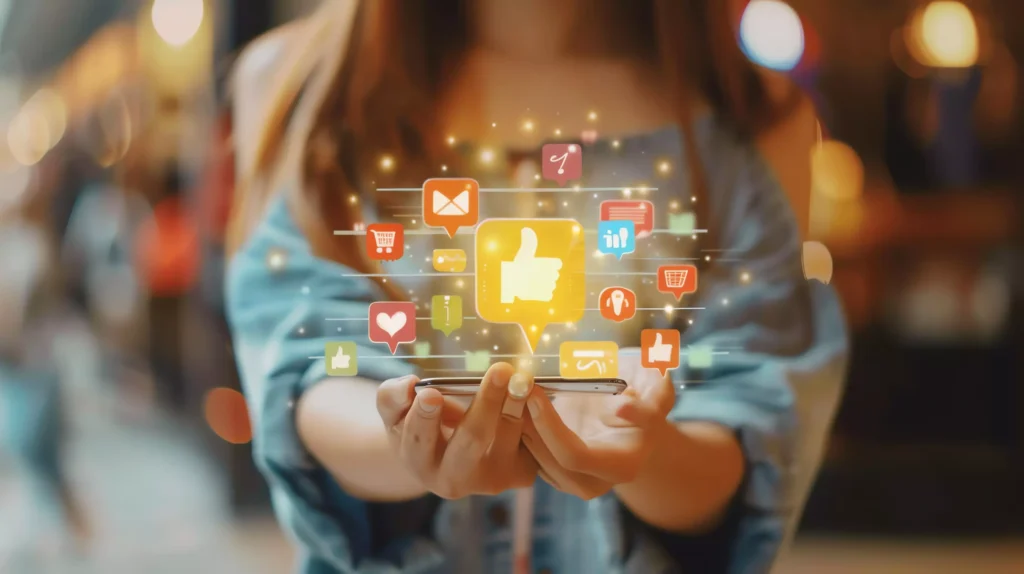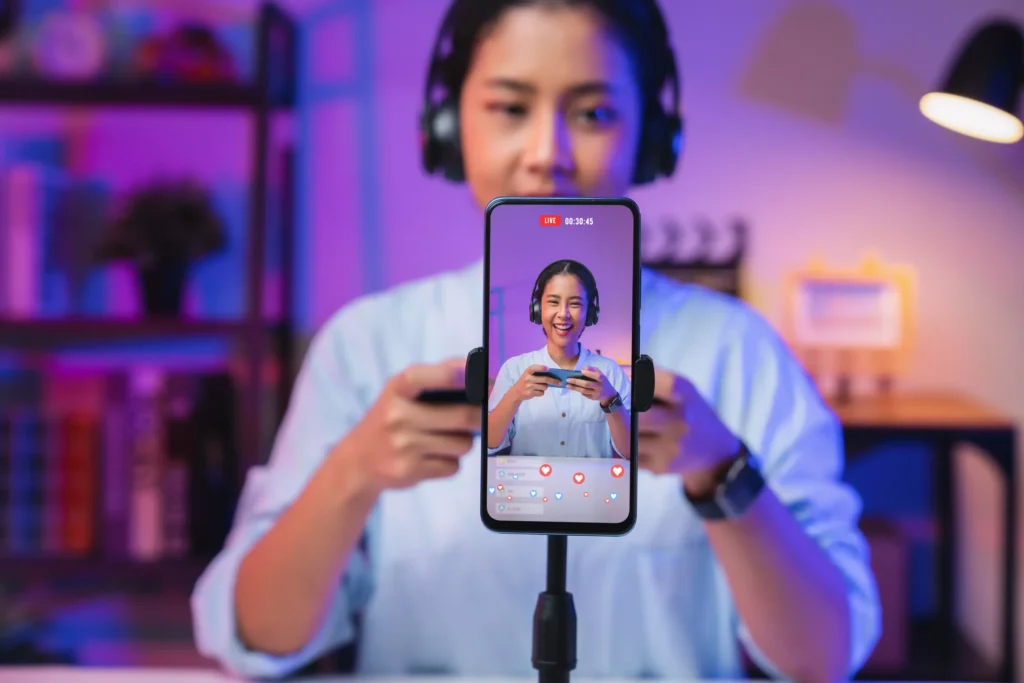The Lion's Den
B2B Influencer Marketing
How To Hire Content Creator
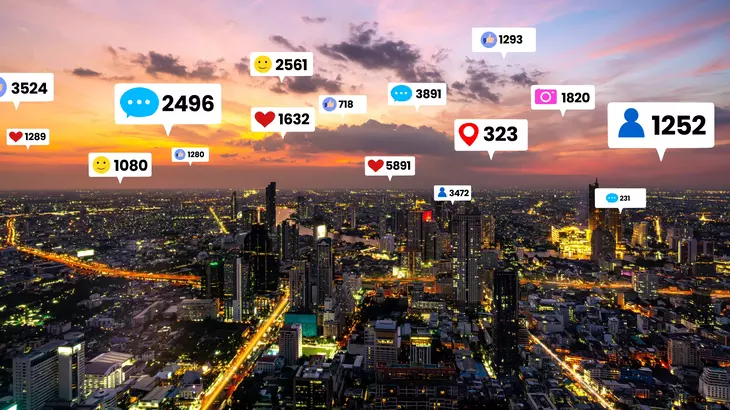
What Is B2B Influencer Marketing?
B2B influencer marketing is a dynamic strategy where businesses collaborate with influential figures within specific industries to promote their products or services. These B2B influencers are often thought leaders, industry experts, or practitioners who have earned respect and built substantial followings in their niche markets. By leveraging knowing how to hire a content creator, companies can tap into pre-established networks of trust and credibility, effectively amplifying their reach and impact. An effective influencer marketing campaign is crucial in B2B influencer marketing as it helps establish clear goals, co-create content with influencers, and understand the target audience to maximize the campaign’s effectiveness.
In contrast to B2C marketing, where consumer influencers often prioritize aesthetics and mass appeal, B2B influencer marketing focuses on domain-specific expertise and thought leadership. The objective is to provide valuable insights and demonstrate tangible business benefits. Collaborations may include guest blogging, webinars, case studies, or speaking engagements at industry conferences.
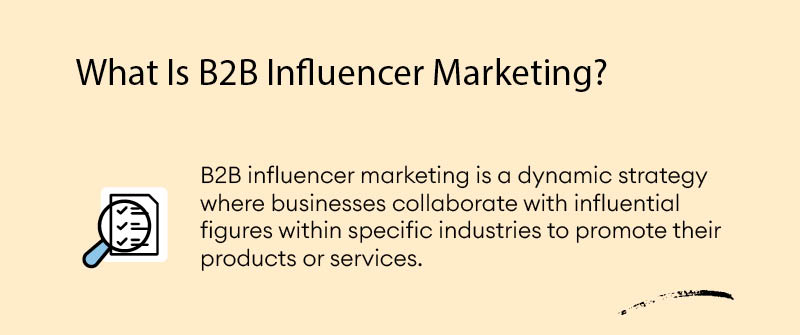
Key Players in B2B Influencer Marketing
Effective B2B influencer marketing involves several key players: the business seeking promotion, the chosen B2B influencers, and often a B2B influencer marketing agency to facilitate and manage the collaboration. An influencer partnership serves as a tacit endorsement from a credible industry leader, significantly enhancing brand credibility and trust. These entities work together to craft a cohesive marketing strategy that aligns with the company’s goals and the influencer’s audience. Platforms tailored for B2B influencer marketing, such as LinkedIn and specialized industry forums, play a crucial role in finding and engaging the right influencers.
Why a B2B Influencer Marketing Strategy Matters
The significance of B2B influencer marketing lies in its ability to drive meaningful engagement and build industry authority. By partnering with influencers, companies can enhance their brand credibility, as these endorsements from respected industry leaders help establish trust. By associating with trusted figures, companies can more effectively position themselves as leaders and innovators. This approach not only fosters trust but also accelerates decision-making processes within often lengthy B2B sales cycles.
What Are the 4 Types of B2B Marketing?
Explanation of Content Marketing
Content marketing is the linchpin of modern B2B marketing strategies. Influencer content plays a crucial role in building trust and engagement with audiences. By creating valuable, informative content, companies can attract and engage potential clients. This involves producing a variety of content types, including whitepapers, blog articles, eBooks, webinars, and case studies. The focus is on providing solutions to problems or educative content that establishes your brand as a thought leader in the industry.
Example:
An effective content marketing campaign might include a series of expert insights articles that address common pain points in your industry, showcasing both your expertise to addressing client needs.
Overview of Account-Based Marketing (ABM)
Account-Based Marketing (ABM) is a highly focused business strategy in which a marketing team treats an individual prospect or customer like its very own market. ABM involves tailoring marketing campaigns specifically to one or a group of high-value accounts. This highly personalized approach often results in stronger relationships and higher ROI.
Example:
Suppose you’re targeting a Fortune 500 company. Instead of a generic campaign, you would create content, promotions, and communications specifically tailored to that company’s needs and pain points.
Role of Social Media Marketing in B2B for Target Audience
Social media marketing is indispensable even in the B2B landscape. Contrary to popular belief, social media channels are highly effective for B2B marketing. Platforms like LinkedIn, Twitter, and even Facebook provide fertile ground for reaching and engaging with business professionals.
Example:
Sharing industry news, engaging in relevant discussions, and promoting content through these platforms can increase brand awareness and credibility.
Importance of Relationship Marketing
Relationship marketing is all about nurturing long-term relationships rather than focusing on quick wins. Enhancing brand loyalty is crucial in B2B marketing, as more buyers now conduct their own research and are influenced by word-of-mouth recommendations. Building strong relationships with clients fosters loyalty and can result in long-term business partnerships.
Example:
This could involve regular check-ins with clients, personalized communication, and exceptional customer service. Effective relationship marketing turns customers into advocates, generating stronger word-of-mouth and referrals.
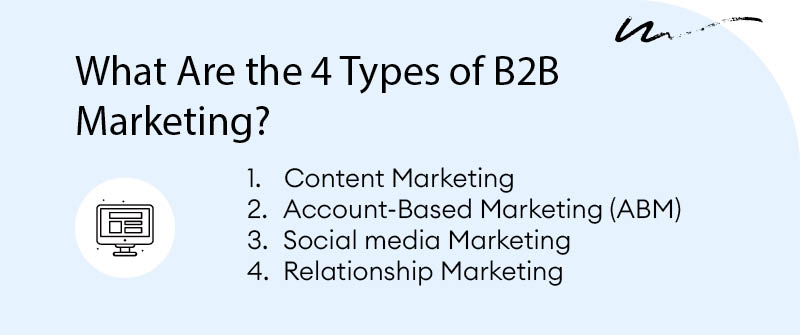
What Are the 4 C’s of B2B Marketing?
Introduction to the 4 C’s: Customer, Cost, Convenience, Communication
Understanding the 4 C’s of B2B marketing—Customer, Cost, Convenience, and Communication—is key to crafting a successful B2B influencer marketing strategy. Unlike traditional models that emphasize product-oriented approaches, the 4 C’s focus on the customer’s needs and preferences, thereby elevating your strategy from merely transactional to truly transformational.
Customer
The first ‘C’ stands for Customer. Put yourself in your customer’s shoes. What are their pain points? How can your business offer customized solutions to their unique challenges? Your B2B influencer marketing strategy should be centered around delivering real value to your target audience. By leveraging deep industry knowledge, you can better understand their specific needs and preferences, creating more compelling and relevant marketing messages.
Cost
Cost isn’t just about the price tag. It encompasses the total value equation that includes what’s gained or saved by choosing you over a competitor. In the B2B realm, where purchases are usually high-stakes, highlighting cost-effectiveness can make your proposition irresistible. Use B2B influencer marketing statistics to substantiate claims about cost benefits to sway decision-makers.
Convenience
Convenience addresses how easy it is for customers to find, evaluate, and purchase your product or service. In the digital age, this involves seamless user experiences, efficient distribution channels, and robust after-sales support. Making the buying process as frictionless as possible can set you apart in the crowded B2B marketplace.
Communication
Effective Communication is the backbone of a successful B2B relationship. Developing a comprehensive influencer strategy is crucial for effectively leveraging B2B influencer marketing and enhancing trust with your audience. This involves transparent, consistent, and engaging interactions that build trust over time. Your communication strategy should leverage multiple channels—including social media and email campaigns—to keep your audience informed and engaged. Customized messaging that addresses specific challenges can create a significant impact.
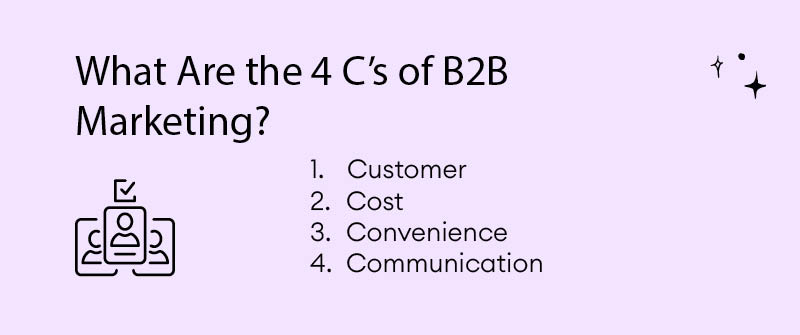
Importance of Each Element Within a B2B Strategy
The synergy of the 4 C’s in a B2B strategy can’t be overstated. When Customer needs are prioritized, Cost is justified with robust value propositions, Convenience is optimized for seamless user experiences, and Communication is transparent and engaging, you create an ecosystem where your business thrives. Each ‘C’ complements the other, creating a holistic approach to marketing that drives results.
Examples and Case Studies
Consider a leading B2B company that successfully implemented the 4 C’s. By focusing on Customer needs, they tailored their solutions, leveraging B2B influencer marketing statistics to highlight cost advantages. By collaborating with B2B influencers who have access to niche audiences, they connected with specialized groups, enhancing engagement and conversions, particularly when entering new market segments. They optimized Convenience through a user-friendly digital interface and maintained open lines of Communication that consistently engaged their audience. The result? A substantial uptick in customer retention and overall sales.
Developing an Effective B2B Influencer Marketing Strategy
Crafting a successful B2B influencer marketing strategy requires careful planning and execution. Here are key components to consider when developing your approach:
- Define Your Objectives: Start by setting clear, measurable goals for your influencer marketing campaign. Whether you aim to increase brand awareness, generate leads, or boost engagement, having specific objectives will guide your strategy and help you evaluate success.
- Identify Your Target Audience: Understanding your audience is crucial. Develop detailed buyer personas that include demographics, pain points, and preferences. This insight will help you select the right influencers who resonate with your audience and enhance the credibility of your message.
- Select the Right Influencers: Not all influencers are created equal. Look for individuals who not only have a strong following but also align with your brand values and industry. Consider their expertise, engagement rates, and audience demographics to ensure a good fit. Micro-influencers, in particular, can provide high engagement levels and authenticity, often at a lower cost.
- Collaborative Content Creation: Co-creating content with influencers can lead to more authentic and impactful messaging. Work together to develop valuable resources such as blog posts, webinars, or case studies that showcase both your expertise and the influencer’s insights. This collaboration not only strengthens your relationship but also allows you to tap into their audience effectively.
- Utilize Multiple Channels: Leverage various platforms to maximize your reach. While LinkedIn is a key player in B2B marketing, don’t overlook the power of industry-specific forums, podcasts, and even video content on platforms like YouTube. Diversifying your channels will enhance your visibility and engagement.
- Monitor and Measure Performance: Establish metrics to track the success of your influencer marketing efforts. Key performance indicators (KPIs) may include engagement rates, website traffic, lead generation, or social media mentions. Regularly analyze these metrics to assess what’s working and what needs adjustment.
- Build Long-Term Relationships: Rather than viewing influencer partnerships as one-off transactions, aim to cultivate ongoing relationships. Long-term collaborations can lead to deeper trust and credibility, making your brand more recognizable in the industry.
By implementing these strategies, businesses can harness the full potential of B2B influencer marketing, effectively increasing their reach, credibility, and impact in their respective markets.
How to Become a B2B Influencer
Steps to Establish Authority in a Niche with Industry Experts
Establishing authority is the cornerstone of becoming a successful B2B influencer. Start by immersing yourself in your chosen niche, staying updated on industry trends, and consistently sharing valuable insights. Write blogs, create videos, and publish whitepapers to showcase your expertise. Participating in industry events and speaking engagements can also solidify your reputation.
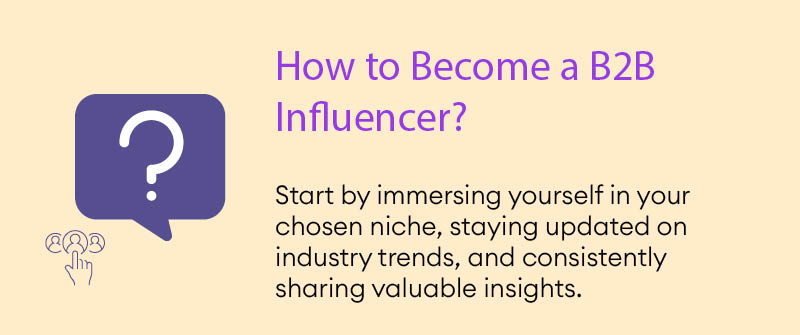
Building a Personal Brand
Your personal brand is your public identity and should clearly reflect your expertise and values. Develop a strong online presence through social media platforms, a professional website, and consistently branded content. Share content that highlights your knowledge and opinions, and engage with your audience regularly. This authenticity and consistency will help build trust and recognition.
Networking and Collaborations
Networking is essential in the B2B influencer arena. Influencer partnerships are crucial for building trust and mutual value, leading to broader recognition and credibility within the industry. Build relationships with other influencers, thought leaders, and potential clients. Attend industry conferences, engage in online forums, and participate in webinars. Collaborations, such as guest blogging and joint ventures, can amplify your reach and credibility.
Utilizing B2B Influencer Marketing Platforms
Leverage B2B influencer marketing platforms to connect with brands and other industry influencers. An effective influencer marketing program requires detailed reports and data analysis to optimize strategies and justify the investment of time and resources. Platforms like LinkedIn offer opportunities to share your thought leadership through articles and posts. Additionally, using specialized platforms designed for influencer marketing can provide data-driven insights to optimize your strategy.
Becoming a B2B influencer is a journey that requires dedication, authenticity, and strategic efforts. By consistently delivering value, building a recognizable personal brand, and leveraging networking opportunities, you can position yourself as an influential voice in your industry.
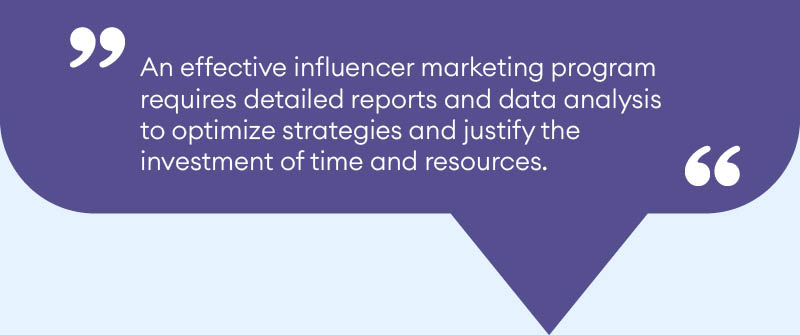
Conclusion: Leveraging B2B Influencer Marketing for Success
As we draw the curtain on our comprehensive exploration of B2B influencer marketing, it’s clear that the value proposition for marketing professionals is immense. Weave these strategies into your campaigns to tap into the powerhouse that is influencer marketing, and you’ll not just stay afloat, but thrive in the competitive market landscape.
Reviewing Key Insights and Actionable Strategies
We’ve dissected the essence of B2B influencer marketing, outlined its crucial differences from B2C strategies, and illuminated the path to effectively leverage it. Whether you’re diving into content, account-based, social media, or relationship marketing, the integration of influencers can amplify your reach and impact.
Implementing the 4 C’s — Customer, Cost, Convenience, and Communication — ensures your strategies are customer-focused and efficiency-driven. This, combined with the 7 P’s approach, offers a holistic framework adaptable to varied business contexts, ensuring you hit the right notes across product, price, place, promotion, people, process, and physical evidence.
Future Trends in B2B Influencer Marketing
As we look to the future, issues like the advancing role of AI, the increasing reliance on data analytics, and the growing importance of authenticity and transparency are all poised to shape B2B influencer marketing. Keeping abreast of these trends will help you stay ahead of the curve and maintain relevance in a rapidly evolving marketplace.
Final Tips for Effective Implementation
Ensure you foster genuine relationships with your influencers, anchor your strategies in clear objectives, and continually monitor and adjust your campaigns based on performance data. Identifying relevant influencers who align with your brand’s identity and possess the ability to drive meaningful conversations is crucial for authentic and resonant collaborations. Collaborating with a dedicated B2B influencer marketing agency can streamline your efforts and provide tailored expertise, paving the way for enhanced campaign success.
Unlock the potential of influencer marketing with Lionize. By leveraging our AI-powered platform, you’ll save time, streamline processes, and achieve unmatched campaign success. Our performance-based partnership means you can dive in risk-free. Sign up for free today and revolutionize your influencer marketing endeavors!




















